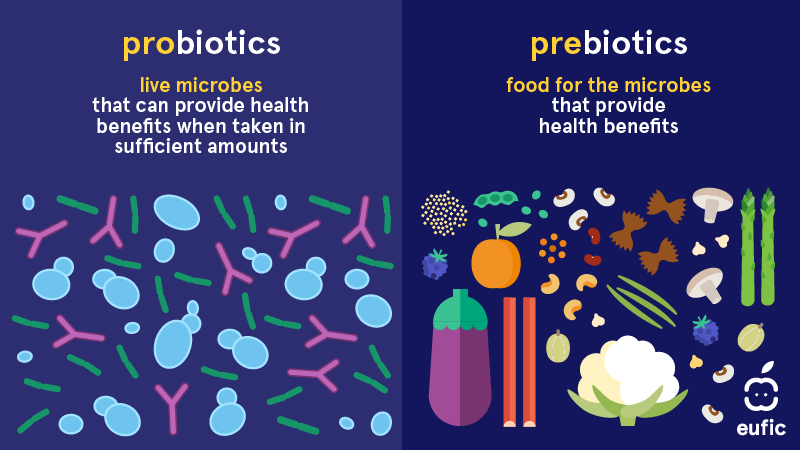What are prebiotics and probiotics and are they important for health?
Last Updated : 23 June 2023The human body, and mainly the digestive tract, is home to trillions of microorganisms. Bacteria, fungi and viruses, as well as the less known archaea and protozoa, all live side by side in our gut. These tiny living organisms, collectively known as the gut microbiota, can have a great impact on our health and well-being.1 Over the past few decades, researchers have been investigating how we can influence our gut microbiota through diet. In this article we explain what are prebiotics and probiotics, and explore their potential to improve our health.
What are prebiotics and probiotics?
Prebiotics and probiotics are different groups of substances with distinct roles.
Prebiotics are non-digestible fibres that act as food for microorganisms, promoting their growth and activity.2 Probiotics on the other hand, are living microorganisms that, when consumed in adequate amounts, can provide health benefits.3
In simpler terms, prebiotics are the food source for our gut bacteria, while probiotics are the live bacteria that offer health benefits when consumed. Think of your gut as a garden: probiotics are the seeds you plant, while prebiotics are the fertilizer that helps them grow.

Prebiotics: how do they work?
Prebiotics are non-digestible food components, such as certain dietary fibres. Once they arrive in the intestine, they become food for beneficial microorganisms in the gut and are broken down into chemicals that stimulate their growth and activity.4 By eating a variety of prebiotic foods, we can feed the beneficial microorganisms in our gut, helping to create a healthier and more diverse microbiota. This can lead to better intestinal health and metabolism and also help prevent harmful bacteria ("pathogens") from growing in our gut.
Even though the term prebiotics encompasses a broad range of compounds, they all contribute to good digestive health. Some functions of prebiotics include supporting nutrient metabolism and regulation of our immune system, and influencing our disease risk. Prebiotics boost the production of health-promoting substances like short-chain fatty acids (SCFAs), that have been linked to reduced risk of colorectal cancer.4 Evidence suggests that prebiotics also help with constipation by promoting more regular, frequent and well-formed bowel movements.5
Probiotics: what do they do and how do they work?
Probiotics are microorganisms that can benefit our health in many different ways. There are seven commonly used types of probiotic microorganisms: Lactobacillus, Bifidobacterium, Saccharomyces, Streptococcus, Enterococcus, Escherichia, and Bacillus.6 Each of these also consists of dozens of strains which can positively affect the gut microbiota, boost the immune system or have other health benefits. However, it's important to remember that the effects of each probiotic strain are unique and can vary based on the amount consumed and that research into these understanding these effects is still in early stages.
To be considered a probiotic, a food or product should contain a specific minimum amount of microorganisms, the so-called colony-forming units (CFU), for its claimed health benefit. For example, consuming yoghurt with at least 108 CFU of living Lactobacillus delbrueckii subsp. bulgaricus and Streptococcus thermophilus bacteria, commonly used microorganisms as yoghurt starter cultures, has been found to improve digestion of lactose in people with lactose maldigestion.7
Some probiotic strains might also help improve symptoms of diseases such as ulcerative colitis8 or irritable bowel syndrome9, and regular consumption of probiotics has been shown to lower the likelihood of upper respiratory tract infections10 like the common cold. Probiotics are also used to lower the risk of antibiotic-associated diarrhoea.11
There is still more research needed to fully understand the effects of probiotics on these and other health outcomes such as blood cholesterol, body weight, and body fat, but the modulation of our gut through pre- and probiotics has a huge potential for many positive benefits of our health.12
What foods contain prebiotics and probiotics?
Prebiotics are found in many foods, for example in beans, grains (such as oats, barley, rye), vegetables (such as greens, onions, garlic, artichokes, sugar beet, asparagus, peas, chicory), and some fruits (such as bananas, apples and berries).
Fermented foods, for example yoghurt, kefir, sauerkraut or kimchee, contain a wide variety of living microorganisms, but not all of them can be considered as probiotic. This can be because their specific strains have not been identified or linked to a specific health benefit, they don’t contain the microorganisms in sufficient amounts, or the microorganisms cannot withstand the acidic environment of our stomach which breaks them down before they can reach our intestines. Some specific probiotic strains are added to some functional foods (such as fermented milk products or yoghurts) and are also available as supplements.
Are prebiotics and probiotics safe?
In healthy people, prebiotics and probiotics are usually safe to consume and rarely cause health problems.13 However, some people may temporarily experience gas and intestinal discomfort when adding more into their diets. In people with severe illnesses or compromised immune systems, probiotics may increase the risk of infections. In these cases, consult your doctor or health professional for further advice.
Conclusion
The various microorganisms in our gut have a crucial role in our health and well-being. Prebiotics feed the good bacteria already existing in your gut while probiotics directly introduce new strains of beneficial microbes that may result in health benefits. Both pre- and probiotics show promising health effects but require more research to fully unveil their role and impact on the gut microbiome, general health as well as specific diseases. This is why international research projects such as the EU-funded Human Microbiome Action project are important to improve our understanding of the human microbiome and its impact on human health. Each person however can help to establish and maintain a healthy and diverse gut microbiota by consuming a balanced diet with a high variety of plant-based foods.
 This article was produced in collaboration with Human Microbiome Action. Human Microbiome Action has received funding from the European Union’s Horizon 2020 Research and Innovation programme under Grant Agreement No. 964590.
This article was produced in collaboration with Human Microbiome Action. Human Microbiome Action has received funding from the European Union’s Horizon 2020 Research and Innovation programme under Grant Agreement No. 964590.
References
- The Human Microbiome Project Consortium (2012) Structure, function and diversity of the healthy human microbiome. Nature 486:207-214.
- Gibson G, Hutkins R, Sanders M et al. (2017) Expert consensus document: The International Scientific Association for Probiotics and Prebiotics (ISAPP) consensus statement on the definition and scope of prebiotics. Nature Reviews Gastroenterology & Hepatolo
- Hill C, Guarner F, Reid G et al. (2014) The International Scientific Association for Probiotics and Prebiotics consensus statement on the scope and appropriate use of the term probiotic. Nature Reviews Gastroenterology & Hepatology 11:506–514.
- Davani-Davari D, Negahdaripour M, Karimzadeh I et al. (2019) Prebiotics: Definition, Types, Sources, Mechanisms, and Clinical Applications. Foods 8(3):92.
- Schoemaker MH, Hageman JHJ, Ten Haaf D et al. (2022) Prebiotic Galacto-Oligosaccharides Impact Stool Frequency and Fecal Microbiota in Self-Reported Constipated Adults: A Randomized Clinical Trial. Nutrients 14(2):309.
- US National Institutes of Health – Office of Dietary Supplements website. Accessed 23 June 2023.
- European Food Safety Authority (2010) Scientific Opinion on the substantiation of health claims related to live yoghurt cultures and improved lactose digestion. EFSA Journal 8(10):1763.
- Kaur L, Gordon M, Baines PA et al. (2020) Probiotics for induction of remission in ulcerative colitis. Cochrane Database of Systematic Reviews 3(3):CD005573.
- Satish Kumar L, Pugalenthi LS, Ahmad M et al. (2022) Probiotics in Irritable Bowel Syndrome: A Review of Their Therapeutic Role. Cureus 14(4):e24240.
- Zhao Y, Dong BR & Hao Q (2022) Probiotics for preventing acute upper respiratory tract infections. Cochrane Database of Systematic Reviews. 8(8):CD006895.
- Goodman C, Keating G, Georgousopoulou E et al. (2021) Probiotics for the prevention of antibiotic-associated diarrhoea: a systematic review and meta-analysis. BMJ Open 11:e043054.
- Gagnon E, Mitchell PL, Manikpurage HD et al. (2023) Impact of the gut microbiota and associated metabolites on cardiometabolic traits, chronic diseases and human longevity: a Mendelian randomization study. Journal of Translational Medicine. 21(1):60.US Nat
- Blaabjerg S, Artzi DM & Aabenhus R (2017) Probiotics for the Prevention of Antibiotic-Associated Diarrhea in Outpatients-A Systematic Review and Meta-Analysis. Antibiotics 6(4):21.